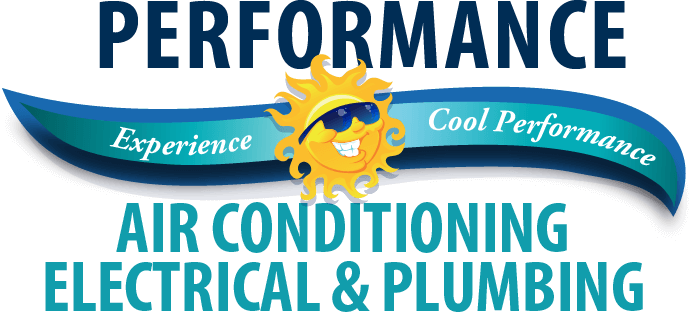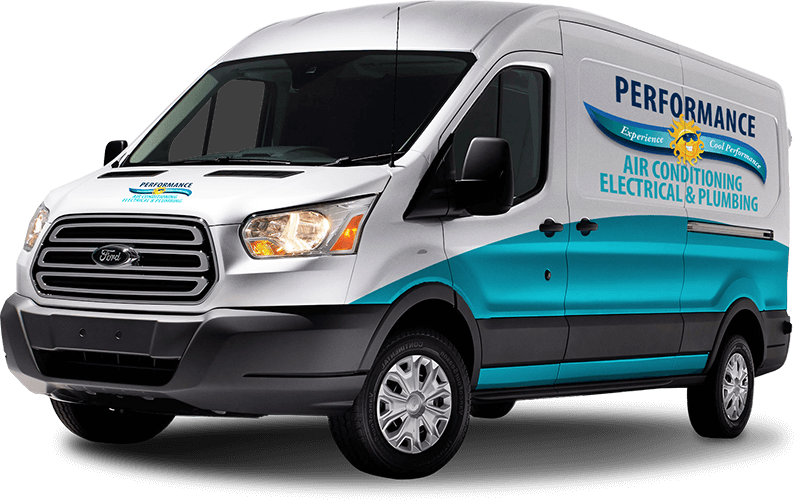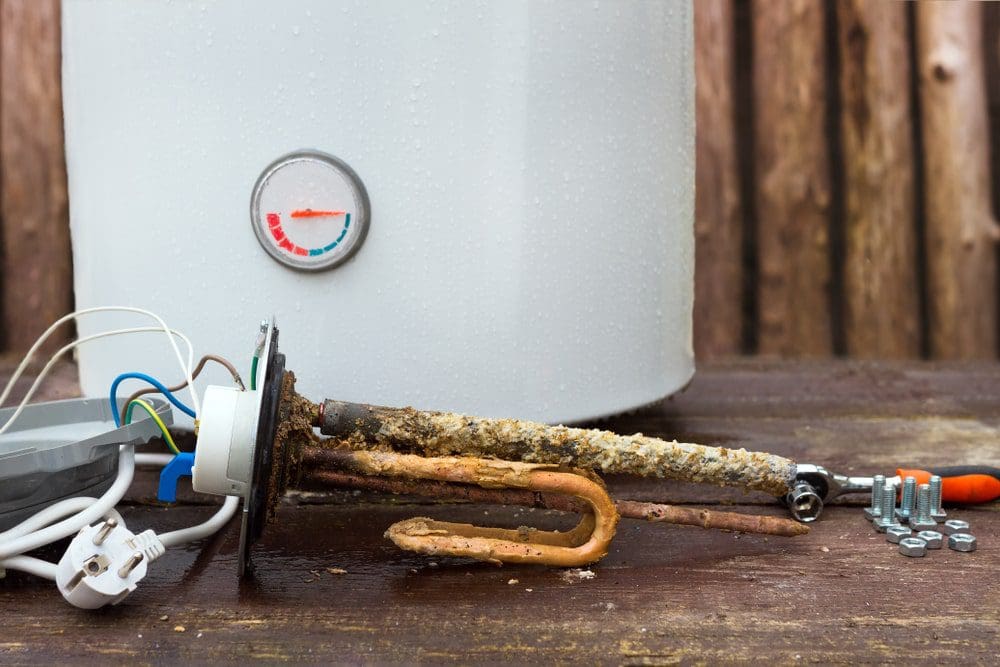
Heat, warmth, and fire are integral to our bodies and to our history. Without heat, we’re just as well off as Neanderthals. That’s why when your hot water stops working, it’s more than an inconvenience. No running hot water poses health risks (can anyone say no sanitized dishes?) and bacteria growth since hot water kills bacteria…not to mention shocks your body during icy showers. When your hot water stops running, you may be able to fix it—or you may need to call in the professionals. Learn more about the causes behind why your home may be out of hot water so you can get your home back up and running.
No Hot Water in House: Common Causes
When figuring out why there’s no hot water, the first step is to identify what went wrong. In the case of no running hot water, typically, the cause is one of the below problems:
- Hot water heater not working
- Thermostat problems
- Plumbing system problem
- Pressure valve issue
- Power supply interruption
Of course, there could be other sources. For example, it could be a sign of a gas leak. If you believe you have a gas leak, find a safe area away from your home and call emergency services immediately.
1. Water Heater Issues
A water heater pulls in cold water from your home’s water supply pipe, then heats the water by electric elements or a gas flame. Once the water is hot, the tank distributes the hot water throughout your home so it’s ready when you run the dishwasher or crank on a hot bath.
When you’re out of hot water, the first place to check is the water heater. Over time, components of your water heater degrade. Gaskets can blow, valves can become stuck, and bolts loosen. Once a piece of your water heater starts to wear, it can prevent the entire tank from adequately working.
First, check your water heater to see if there’s a leak; there should never be any water outside of your tank, so a leak will be easy to spot. If the problem is not obvious, it could be something like the pilot light is out or a part has worn down.
2. Thermostat Problems
A thermostat is a vital tool in maintaining your home’s water temperature. A water heater thermostat should be set to a range between 120 degrees and 140 degrees Fahrenheit.
Usually, most water heater tanks have two thermostats – one at the top of the tank and one at the lower. Both should be covered beneath access covers on the tank and should be easy to locate. Check the temperature gauge on both thermostats to ensure they’re both working. If they seem broken, they may require extensive repairs.
3. Plumbing System Problem
Sometimes, a lack of hot water is a symptom of a more significant problem within your home’s plumbing system. There could be leaks in your plumbing line, or your plumbing system is too old. Water tanks last between ten and twenty years, so it’s entirely possible that your system is too old and needs a total replacement.
4. Pressure Valve Issue
Water pressure that exceeds 80 psi can be harmful to your home’s plumbing system. It can cause damage to appliances and even result in leaks and water hammers. To prevent these issues, it’s recommended to install a pressure regulator valve on your main water line. However, it’s important to note that the valve can become blocked due to high mineral content in your municipal water supply, leading to lower water pressure in your home.
5. Power Supply Interruption
For your water heater to work correctly, it requires a specific voltage range. Most residential water heaters need 220/240 volts, while some require 110/120 volts.
If the voltage is too low or too high, the heater will shut down as a precautionary measure. This automatic feature prevents a short circuit or other electrical issues.
If you suspect your water heater is not receiving enough voltage, it’s likely due to an issue with your home’s electrical system. It’s essential to have a qualified electrician inspect this problem right away. Once the voltage returns to normal, your water heater should function normally again.
Troubleshooting
Are you ready to whip your water heater into shape? Grab your toolkit and sense of adventure and read these troubleshooting steps.
1. Inspect Your Water Heater
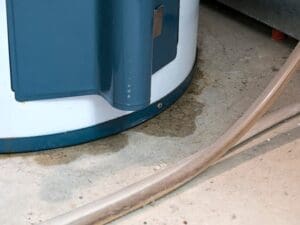
The first step is to do a general analysis of your water heater. Look for leaks, cracks, or any other sign of wear and tear. If you find any water outside the tank, that’s a good indication of a leak as there should never be water outside the tank.
2. Examine The Plumbing
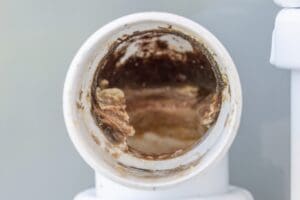
The problem could also be because of a blockage or leak in the plumbing. If you feel comfortable doing so, insert a snake in the water heater plumbing to see if there’s a blockage.
3. Verify power and gas supply.
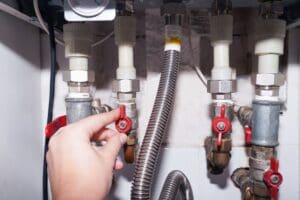
If the water heater tank looks fine and there appears to be nothing wrong with the plumbing, the problem could lie with the power or gas supply.
To resolve gas flow issues, first, verify if the gas valve is open or closed. Also, inspect the gas line for any bends that may be obstructing the flow. If the issue persists despite adjusting the gas flow, contact the gas company to confirm that their service is available in your area and that your account is up to date. Do not attempt to fix this yourself.
When You Need a Professional Plumber
Don’t get us wrong – it’s always exciting to tackle home DIY projects on your own. However, there comes a time when even the scrappiest homeowners are in over their heads. Here are some signs that you may need a professional water heater technician:
- There’s a problem with a gas line
- The equipment needs to be replaced
- Your water heater tank is older than ten years
If your shower water pressure is low, your kitchen sink has low water pressure, or you’re constantly wondering “Why is my water pressure low?” then it’s time to contact a professional for plumbing repairs. Additionally, if you believe you need emergency plumbing (there’s a serious leak that may cause destruction to your home), call for help immediately.
Importance of Safety With Hot Water
Hot water isn’t just a modern luxury, it’s necessary for proper health. Bacteria and mold growth can occur in plumbing lines and water heaters. However, when there’s adequate heating, the hot water eliminates any insidious growth and delivers healthy, safe water.
However, without that hot water, you become vulnerable to excess bacteria growth.
Additionally, it’s vital to sanitize and clean with hot water. Your dishes won’t be sterilized, your clothes will remain dirty, and there will be no way to clean your hands.
Needless to say, having access to hot water is paramount to your health.
Not hot water? Call Our Team.
When your hot water fails, it could be as easy as turning on the thermostat and as significant as a gas leak. For timely, excellent water heater services, call Performance. Our water heater technicians will analyze and determine the problem so you can get hot water right away. Schedule an appointment online to get your house back in working order.
